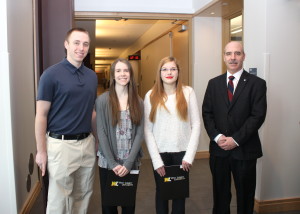Three chemistry majors were recently honored as the first recipients of the Bayer Chemistry Scholarship at West Liberty University.
Juniors Michael B.  Bates of Spencer, W.Va. and McKensie L. Mason of Pickerington, Ohio, and sophomore Katelyn E. Yauch of Pittsburgh, Pa., were selected based on their scholarship and career focus. Requirements included a 3.5 GPA in chemistry and a 3.0 cumulative GPA overall.
Bates of Spencer, W.Va. and McKensie L. Mason of Pickerington, Ohio, and sophomore Katelyn E. Yauch of Pittsburgh, Pa., were selected based on their scholarship and career focus. Requirements included a 3.5 GPA in chemistry and a 3.0 cumulative GPA overall.
“We are pleased to award this scholarship to these hard working students. As a science based company, Bayer has long promoted education and literacy in the area of STEM (science, technology, engineering and mathematics). This opportunity is one way that we are able to help local deserving students who are dedicated to this important discipline. At the same time we are developing new relationships to the benefit of our future talent pipeline,” said Bayer MaterialScience New Martinsville General Plant Manager, Dr. Jeffrey S. Bolton.”
Assistant Professor of Chemistry Dr. Douglas L. Swartz II is co-chair of the Department of Natural Science and Mathematics at WLU.
“These students have demonstrated a passion for chemistry through their exemplary efforts in the classroom and by participating in undergraduate research projects. They are very deserving of this award and we are grateful to the Bayer Corporation for their support and recognition of our chemistry students and the sciences at West Liberty University through this scholarship.” Swartz said.
Yauch is the treasurer of the chemistry club on campus and spent last summer as a research assistant, working with Dr. Swartz who was testing water supplies. She is especially grateful for the Bayer award because it honors in her favorite thing — chemistry!
“I like chemistry so much because it describes and quantifies every activity and action that is completed in the known universe. It is an inescapable truth that, no matter what you are doing, chemistry is involved; it is literally anything and everything. It is objective, unbiased, and the epitome of logic. It’s beautiful,” she said.
Both Bates and Mason are currently doing research for Dr. Theunis van Aardt, assistant professor of chemistry. They are working with organic synthesis in his lab.
“I chose chemistry as a major because it is both a challenging and exciting field. I especially love applying the material I learn in my lecture classes to the laboratory and to my research. I’m currently working for Dr. van Aardt on an organic synthesis project where the ultimate goal is the synthesis of trans–pterocarpans. I am thankful for the opportunities that West Liberty has offered me and especially grateful to Bayer for supporting me as I continue to grow as a student and a scientist,” said Mason.
Bates has enjoyed chemistry since high school and hopes that it will lead to a career in environmental policy work.
“First of all, understanding how the very building blocks of the universe work is incredibly interesting to me. Secondly, ever since I was in high school I imagined that I would be studying chemistry. Thirdly, I believe that environmental chemistry is going to be of great benefit to the world as a whole. Lastly, working in chemistry will potentially give me the ability to work on the government’s environmental policies,” he explained.
“As for our research, trans-pterocarpans have never been synthesized before and it is believed that they may serve as hormonal agents. The research is also multidisciplinary, as we will be performing computational chemistry, that is related to our synthesis project, but this computational work will be done with Dr. Don Serra,” he added. Serra is an assistant professor of chemistry at WLU.
All of the students express pleasure at being the first class to work in the new Campbell Hall labs that opened just about one year ago.
WLU’s chemistry program, within the Department of Natural Sciences and Mathematics, offers a Bachelor of Science in Chemistry degree. The curriculum for this degree conforms to the curriculum guidelines prepared by the Committee on Professional Training of the American Chemical Society and is designed to prepare a strong, liberal arts foundation for future work in industry, graduate school, or professional school.